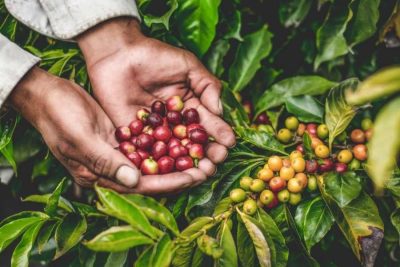Farmers in Binh Phuoc’s borderlands use circular economies; how effective are they?
Farmers in the Bu Dop border region of Binh Phuoc province have discovered “wisdom” from “difficulty,” which is a circular economy model integrating goat farming and pepper cultivation, as a result of failures in agricultural production, particularly for pepper. 
With a herd of 40 goats, Mrs. Tran Thi Lan’s family in Tan Thanh commune, Bu Dop district, can utilize agricultural wastes and food supplies from pepper crops to rear goats. The goat herd’s fertilizer is sufficient to re-fertilize the pepper garden, which helps cut expenditures. Photo by Sy Tuyen – VNA
Goat farming – the lifeline of farmers
In the Bu Dop Border District’s Tan Thanh Herb Goat Cooperative, there are 11 members. As pepper prices are declining, which results in long-term losses for households specializing in pepper farming, this is the primary source of income and a lifeline for farmers with a herd of more than 500 goats.
“Households have at least 10 to 15 goats, and if they have a lot of goats, they may have over 100 goats. Local farmers who are cooperative members continue to manage and cultivate pepper plants because of the steady income from goat farming” as Ms. Nguyen Thi Tam, the deputy director of Tan Thanh Herb Goat Cooperative, explained.

Agriculture waste, which is machine-finely cut and then placed in a trough, serves as the primary food source for goats. Photo by Sy Tuyen
Mrs. Tran Thi Lan’s family, located in Tan Lap hamlet, Tan Thanh commune, and Bu Dop district, earns an additional 40 million VND each year from their herd of more than 40 goats, including meat goats and sows. Additionally, the use of organic fertilizers and goat farming as a source of fertilizer for pepper gardens helps to lower input costs and promotes the healthiest possible growth of pepper plants.
The majority of the goats’ food comes from natural sources found in the field, including maize, grass growing in pepper gardens, and acacia leaves used as pepper posts. According to Ms. Tran Thi Lan, “the quantity of green manure collected from goat husbandry is used to fertilize pepper gardens, helping pepper grow healthily and lowering fertilizer prices.
Ms. Nguyen Thi Tam asserts that keeping goats is simpler than growing pigs, chickens, or other livestock since they are less susceptible to disease, can eat plants from the garden and other agricultural waste, and have fewer health issues than those other livestock species. Industrial feed has a very high cost and fluctuating price for raising other poultry and animal species.
In fact, in the past, in addition to the COVID-19 epidemic’s effects, many pepper growing regions in the region perished from pests and diseases, which caused pepper prices to fall. In that situation, local farmers concentrated on raising animals, primarily goats. the fact that farmers depend on goats when recent outbreaks of diseases affecting cattle, poultry, and crops occur.
“Goat farming has so far provided enormous economic benefits to farmers in the area,” said Mr. Tran Van Thanh. “Goat raising has been an alternative when epidemics broke out, pepper plants died due to pests and diseases.” According to the district’s head of agriculture and rural development, Bu Dop.
Scaling up the circular model in agriculture
As a primarily agricultural area, Bu Dop’s residents rely heavily on agriculture and animal husbandry for their livelihoods.
Approximately 80,000 goats are currently present in the Bu Dop district, according to Mr. Tran Van Thanh. “Goats are raised by almost every farmer’s home in the area. Large households typically have 1,000 children, whereas small homes typically have 15 to 20. According to Mr. Thanh, Bu Dop has been providing the Southeast market as well as many other provinces and cities in the nation with goat meat up to this point.

Hundreds of goats are housed in a row of stables for a family in Tan Thanh commune, Bu Dop district (Binh Phuoc). Photo by Sy Tuyen – VNA
Based on the aforementioned benefits, the Bu Dop district decided to concentrate resources to help locals support a robust development of the goat farming business, including breeding, disease control, processing, and product consumption. The District Department of Agriculture and Rural Development and functional units are currently supporting the transfer of technology, seed sources, disease control, and the construction of concentrated slaughterhouses so that farmers can create the necessary conditions to increase herd size and gradually establish a brand of Bu Dop goat products.
Mr. Thanh asserts that goats are an economically effective livestock choice for farmers, particularly in light of the current COVID-19 pandemic. This is supported by the region’s historical livestock practices. While growing and raising other livestock and poultry species was fraught with challenges, the farming of goats prospered, produced a high and stable level of economic efficiency, and at the same time supported a good number of jobs for people. individuals, ethnic minorities in rural and border locations.
According to the Department of Agriculture and Rural Development of the Bu Dop district, goats are easy to maintain, semi-wild animals that are rarely ill. In addition, goat farming may now make use of residues from the agricultural business that were once abandoned as garbage since they can be used to manufacture goat food.
The transformation of inappropriate cropland and regions where crops have perished due to pests and illnesses into land where grass can be grown in order to rear goats. In addition, using goat farming wastes and manure to reinvest in crops helps farmers lower input costs, which in turn lowers production costs and boosts the competitiveness of goat meat products. This is done to deal with growing agricultural input prices. According to Mr. Tran Van Thanh, this is the “circular economy” concept that the district’s goat farmers are employing.
The elderly, the impoverished, households belonging to ethnic minorities, as well as those who are socially disadvantaged, can all start goat farming. Branch, poor homes, ethnic minority households, and disadvantaged persons in the Bu Dop district can entirely leave poverty and become wealthy through goat farming with the cooperation of local government at all levels.
Additionally appropriate for local workers, goat farming can be started by the underprivileged in society, including the elderly, the impoverished, and homes from ethnic minorities. In the Bu Dop area, branches, poor homes, ethnic minority households, and disadvantaged persons can entirely overcome poverty and become wealthy through goat farming with the help of local government at all levels.
Reference video can be watched here: Link
News and photos: Vietnam News Agency














